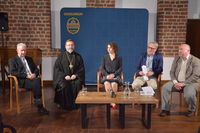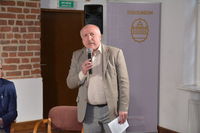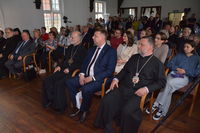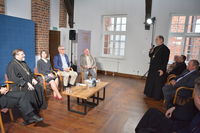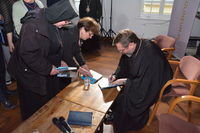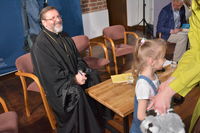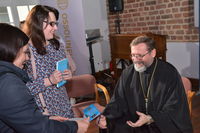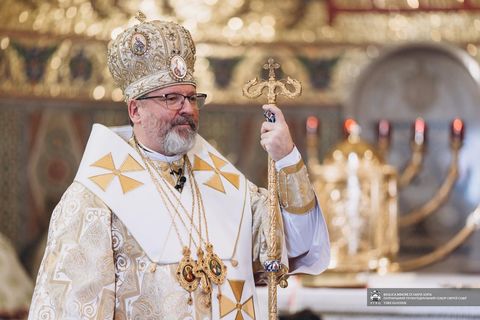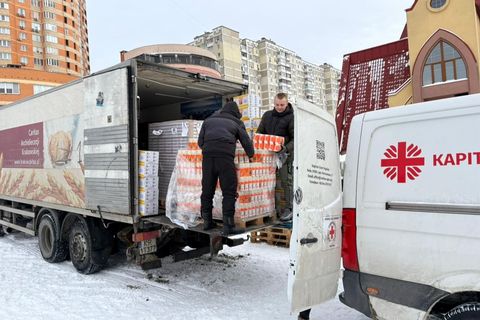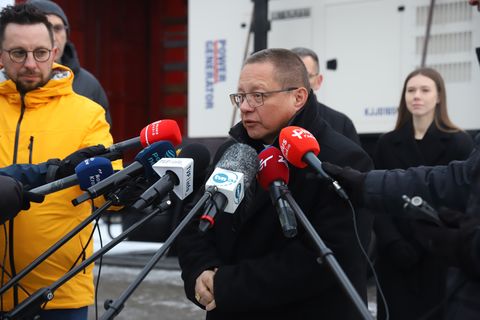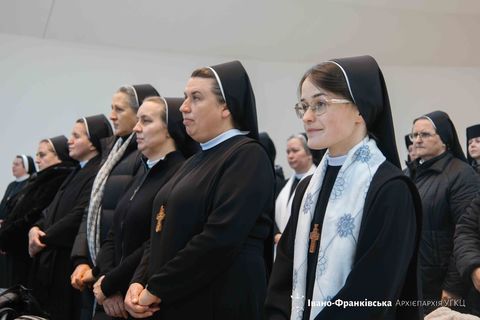“God has not forsaken Ukraine”: presentation of the book of testimony of His Beatitude Sviatoslav in Wroclaw
On May 26, the Ossolineum National Institute in Wroclaw hosted a presentation for Polish readers of the book “God Has Not Forsaken Ukraine” — a conversation between the Head of the UGCC, His Beatitude Sviatoslav, and the editor of the Catholic News Agency, Krzysztof Tomasik, about the war in Ukraine. Both co-authors attended the presentation.
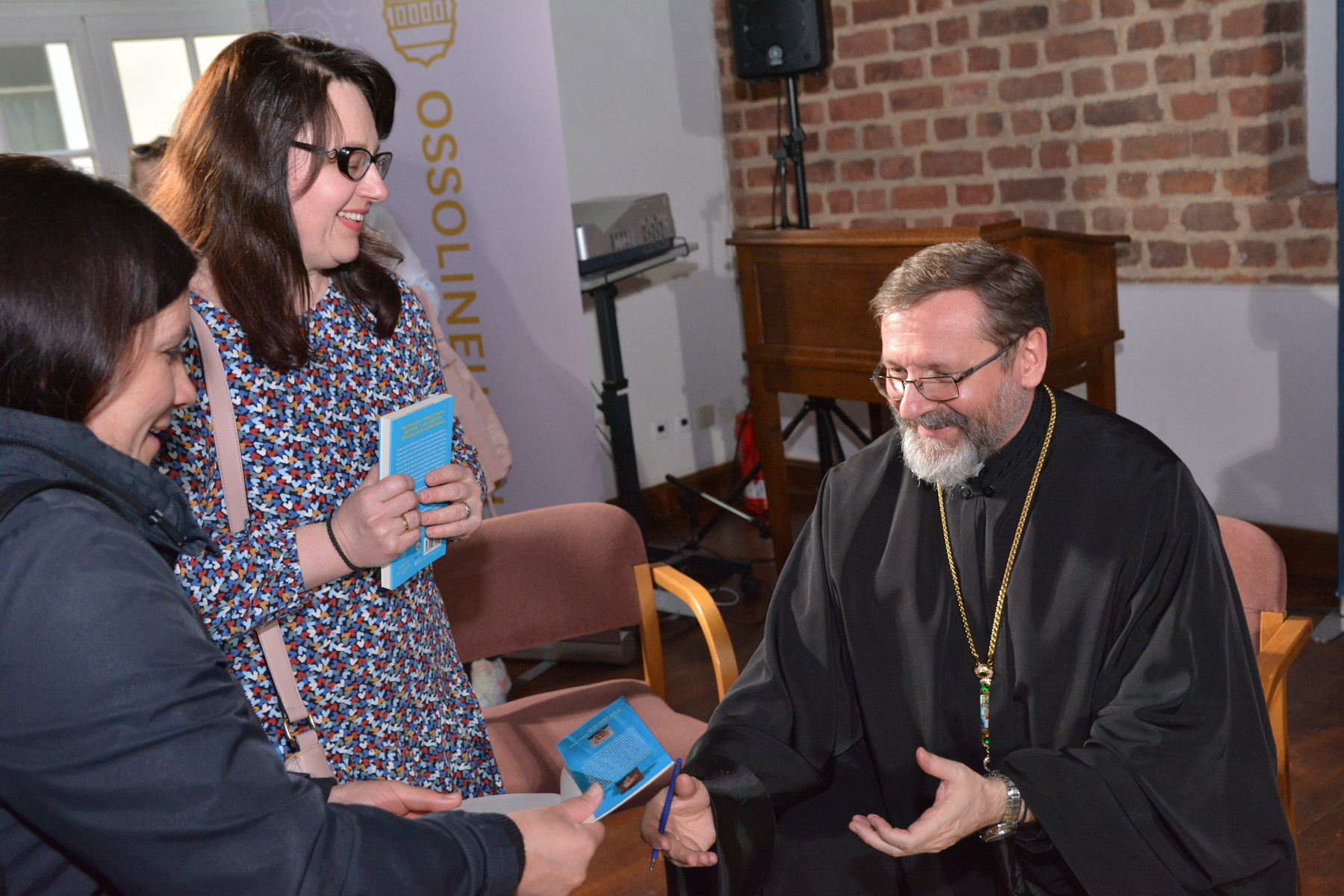
The book is inspired by conversations between journalist and KIA editor Krzysztof Tomasik and the Head of the UGCC during his pastoral visits to the Odesa and Mykolaiv regions last October. Part of the material became a long-read report from this trip to Ukraine, and many hours of recordings of conversations with His Beatitude during the trips evolved into a book. It has already been called a testimony of an eyewitness in the middle of a war, a document that records history, a reflection of the Head of the Church ‘here and now’ on the terrible and big things that Ukraine is experiencing today.
“We talked about the evil nature of war in all its forms: God’s, personal, social, and international. But the main topic of our conversations was the question of the meaning of human life — the meaning beyond the absurdity of war,” says Krzysztof Tomasik: Ukraine is fighting not only for itself but for us, fighting for freedom and the democratic world.”
The title of the book is an allusion to the phrase of Jesus Christ on Golgotha: “My God, my God, why have you forsaken me?” Ukraine today, in the war between ‘man and atrocity,’ asks: “God, why and for what?” The book contains a lot of pain for people, a lot of compassion, both spiritual and tangible, and hope that grows into confidence: “God has not forsaken Ukraine.”
Ukraine at war
“It is not easy to answer the question: where is God when we are being killed?” says His Beatitude about the most painful question for him and all Ukrainians, “But God is there, and He is with people. He is where Ukraine is crucified on the cross today. He is present in all those who are tortured and killed. And He is the source of our hope, our strength to resist evil, to fight for human dignity, for our freedom.”
This question is the focus of the entire book, which began with a short conversation: “How are you?” “Come and see.” And Krzysztof Tomasik came to be and to see.
His Beatitude recalled that trip to the south of Ukraine — pastoral and humanitarian, with the mission of the Patriarchal Curia Wise Cause saying that “we had seen Odesa in a state of depression, with its medium-sized businesses being halted. Odesa had nothing to eat, and it was necessary to feed hundreds of refugees moving on from southern Ukraine via Odesa. And people who had their businesses started volunteering to feed people. Of all the churches in Odesa, the UGCC is not the largest, but it was in first place in humanitarian aid activity. And this was a great discovery for us.
Next up is Mykolaiv. The photo on the cover of the book is a photo of the Mykolaiv Regional State Administration building that was shelled by a Russian missile. The city didn’t even have drinking water at the time, and we had to immediately dig wells.
Next up was Yuzhnoukrainsk, the center of which is the Yuzhnoukrainsk NPP, one of four nuclear power plants in Ukraine, and Balta: ‘Picture it: 50 % of the city’s population are ethnic Russians who once came to build the nuclear power plant, and now they are all patriots of Ukraine.’
Yes, this is not a book about opinions. It is a document, a testimony. These are the questions I am looking for answers to. What does it mean to be a bishop in time of war? What does it mean to be a Christian in a time of war? Because Christians are people who have hope. And this hope, this presence of God among us and in us, is the source of our strength, our resistance to evil.”
War changes everything
The current war in Ukraine is a war of ideology, a war for values. This is how people get rid of illusions at a terrible cost. His Beatitude says that people are changing, and the task of the Church is to help them in this, to support them.
“We, as a church, will do everything to help these people. From the Russian side, we cannot expect objectivity regarding their sentiments because no one asks them there. There is no democracy there, no right to say what you think. But it is very important for those people that someone remembers them. Any sign from Ukraine that comes to them, including through our church, is vital. They are waiting — this is our impression based on information from people who stayed there.”
What Ukraine will look like after the victory
Today, the entire civilized world is on Ukraine’s side. Undoubtedly, Ukraine — the Ukrainian army, the Ukrainian people will win. And now, at various levels, discussions are underway and plans on what to do after the war and how to raise Ukraine from the ruins. At the same time, the fact that there will be significant social problems, problems with the government, corruption, courts, etc., is not withdrawn from the agenda. But almost everyone agrees that everything is changing very quickly and that there will be no return to the old way of life.
“We see that Ukraine is changing because people are changing. And every day we rediscover the face of our people,” says His Beatitude, “Ukraine is changing in various aspects: in the realization of our identity, in the rethinking of our history, in the relations between people. Ukrainians today have a different attitude to the government and a further understanding of their initiative in building their state.”
”
The UGCC Department for Information